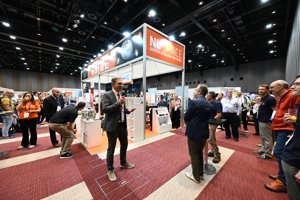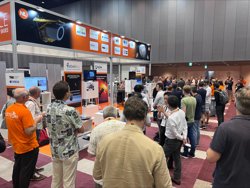Vanguard of Dutch space innovators at space research conference in Japan
Dutch scientists and engineers are in Yokohama, Japan this week for the international SPIE conference. Ramon Navarro of NOVA is involved in the organisation and a Dutch delegation member: 'We are doing this together. This is good for the future of Dutch space research.'
What is the SPIE conference?
'SPIE is the world's leading conference on astronomical telescopes and instrumentation. So it's about high-tech innovations you need to do research on the universe, both from Earth and in space. 'From 16 to 21 June, I expect some 2,500 scientists and engineers from around the world. They talk about the projects they are working on and the technology they are developing for it.'
All in public? Aren't you in competition with each other?
'All participants try to contribute to global science with public money. In that sense, we are colleagues and try to help each other where we can. Of course there is also healthy competition. In the Netherlands, too, we want to develop the best technology fastest in certain areas. But we can't do that alone.'
Which Dutch institutions are travelling to this conference in Japan?
'We are with a large Dutch delegation of about eighty people. I myself am taking part from NOVA, the Dutch Research School for Astronomy. Other institutes are also represented: SRON, ASTRON, TNO and TU Delft. And then there are companies like Cosine, JPE, Demcon, DUI and VDL. All parties working on high-tech instruments, mirrors, sensors and structures.'
How easy
The orange banner and shirts make the Dutch delegation easy to find
is it to find the Dutch delegation at the conference?
'We are very recognisable thanks to the orange NL Space Pavilion from which we as Dutch participants operate together at the conference's fair. Our pavilion has been the best visited pavilion at the fair for years. And those crowds attract even more people. Acting together like this abroad also creates a strong bond among ourselves. It's good for the growth opportunities of Dutch space research.'
How does such a pavilion contribute to the growth opportunities of Dutch parties in global space and astronomy?
'Each of the participants knows what Dutch colleagues can provide. And we all also have a large international network. Sometimes you can match an international contact at the fair with a company or institution from the Netherlands. Then it is literally a three- or four-metre walk and the introduction is a fact. We have been working together under the NL Space flag for years and it works incredibly well.'
How would you describe the nature of the Dutch space ecosystem?
'NL Space is very innovative and strong in collaboration. NOVA is working with TNO and VDL on technology for ESO's Extremely Large Telescope. Similar consortia can be found around SRON when it comes to the new Habitable Worlds Observatory, the successor to the James Webb space telescope, and Cosine, which is developing high-quality and lightweight X-ray mirrors for the space telescope Athena.'
What does the programme look like for the Dutch delegation?
'In Japan, everything is about personal relationships. We have geared this trip entirely to that. First we will visit important suppliers for the Netherlands. Then six days of conference, including three days of exhibition. After SPIE, we will visit Japanese institutes such as space agency JAXA, KAGRA for gravitational wave research, Nobeyama Radio Observatory and the National Astronomical Observatory of Japan. We conclude the trip at the Dutch embassy, where we hold a big reception together with the innovation attachés for existing and potential partners. It is a very intensive period, which I am also very much looking forward to. Because with this trip, you build relationships for life.'
More information
SpaceNed SPIE
SPIE conferentie homepage